Choosing a heating system for your home is more than just a seasonal consideration, it’s an investment in year-round comfort, long-term efficiency, and financial stability. With energy prices fluctuating and environmental awareness growing, selecting the right solution requires a thoughtful approach tailored to your property and lifestyle.
Whether you’re upgrading an ageing boiler or building a new home from scratch, your heating system plays a critical role in both your day-to-day comfort and your carbon footprint. But with so many options available, central heating, electric systems, heat pumps, and underfloor heating, making the right choice can be overwhelming.
Assess the Size and Layout of Your Home
The size and configuration of your property significantly influence which heating systems will work best. A large, detached home with multiple levels may require a more powerful or zoned solution compared to a compact bungalow or flat.
Heat loss should be considered too, older homes with poor insulation may need higher-output systems or a combination of solutions. Conducting an energy performance assessment or home energy audit helps identify inefficiencies in walls, windows, roofs, and floors. These insights inform your heating system decision and may guide upgrades like double glazing or better loft insulation.
Consulting with a heating professional can ensure the system is neither under- nor over-specified. An overpowered system wastes energy, while an underpowered one will struggle to keep the home comfortable, leading to higher bills and premature wear.
Explore Renewable and Efficient Technologies
Modern homeowners are increasingly exploring greener alternatives to traditional gas and electric systems. One popular option is the air-source heat pump, a low-carbon technology that extracts ambient heat from the outside air and uses it to warm your home, even in colder months. Companies offering air-source heat-pump service in Hampshire and across the UK have seen a surge in interest as government incentives and grants make this technology more accessible. These systems are ideal for well-insulated homes and can be paired with underfloor heating or low-temperature radiators to maximise efficiency.
Aside from their environmental benefits, heat pumps offer long-term savings and lower maintenance compared to conventional systems. While the initial installation cost may be higher, many homeowners recover the investment through reduced energy bills and potential access to the Boiler Upgrade Scheme (BUS).
Consider Your Existing Infrastructure
Your current heating setup can impact the cost and feasibility of switching systems. For example, if you already have a wet radiator system connected to a gas boiler, replacing it with a modern combi boiler may be more cost-effective than switching to an entirely new setup.
If your system is outdated or inefficient, a full replacement might be worth considering. In properties with no access to the gas grid, alternatives like electric panel heaters, infrared heating, or biomass boilers might be more suitable.
The location of pipework, boiler flues, and available outdoor space affects your installation options. Understanding the scope of retrofitting work required will help you budget accurately and avoid surprises down the line.
Factor in Running Costs and Maintenance
While upfront costs are important, don’t overlook long-term running expenses. A cheaper system may cost more to operate if it relies on expensive fuels or lacks smart controls. Comparing the seasonal performance efficiency ratio (SPER) and energy label ratings across different systems can provide a clearer view of likely ongoing costs.
Routine maintenance is another key factor. Gas boilers require annual servicing to remain safe and efficient, whereas electric heating systems often require less upkeep. Heat pumps, while reliable, benefit from regular checks to ensure filters, coils, and fans are functioning optimally.
Investing in a system with a strong manufacturer’s warranty and easily sourced spare parts can save both time and money over the life of the unit.
Think About Control and Zoning
Today’s heating systems offer far greater flexibility than in the past. Smart thermostats, programmable timers, and zone-based heating allow you to heat only the rooms you need, when you need them. This not only boosts comfort but significantly reduces energy waste.
If you have varying occupancy throughout the day, such as home offices, guest bedrooms, or infrequently used areas, consider systems that allow individual room control. Underfloor heating, for example, can be configured in zones, while modern radiator systems can use smart valves to optimise use.
Mobile apps, voice control, and integration with home automation systems give you more visibility and customisation than ever, helping you reduce your carbon footprint while staying warm and comfortable.
Balance Budget with Long-Term Value
Choosing a heating solution should balance your current budget with future savings. A high-efficiency boiler might cost less initially than a heat pump, but long-term energy costs could tilt the scales. Likewise, electric heaters might be easy to install but expensive to run if used as a primary source.
Be sure to explore available government incentives, energy company rebates, and finance plans for eligible technologies. Investing a little more upfront in a future-proof system often pays dividends in energy savings, comfort, and reduced environmental impact.
Choosing the right heating solution isn’t just a technical decision, it’s a lifestyle choice that affects how you live, what you spend, and how much energy your home consumes. By considering the size of your residence, energy efficiency, existing infrastructure, and long-term maintenance, you’ll be better equipped to select a system that delivers warmth, value, and peace of mind.












